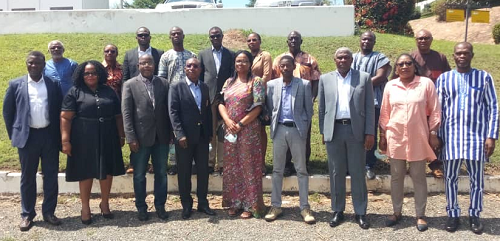
[ad_1]

Participants in a group photo with the President of the ECOWAS Regional Electricity Regulatory Authority (ERERA), Professor Honoré Bogler (4th from right)
The President of the ECOWAS Regional Electricity Regulatory Authority (ERERA), Professor Honoré Bogler, indicates that the second phase of the ECOWAS Regional Electricity Market will be launched in late 2022 or early 2023.
The second phase, which is the real operationalization of the regional electricity market, was initially scheduled for implementation in 2021.
However, the implementation of the second phase could not start as planned due to the impact of the COVID-19 pandemic.
While the first phase attempted to harmonize the activities of the electricity regulators in the Member States, the second phase should be characterized by a competitive market which will help promote efficiency, where the market will be governed by market rules and not by state rules. .
The first phase of the regional electricity market was launched in June 2018 in Cotonou, Benin, as a transitional phase expected to last a maximum of two years before the introduction of the second phase.
Workshop
But speaking with Graphic Online in an interview on the sidelines of a workshop, organized by ERERA in Akosombo in the Eastern region on September 29, 2021, to build the capacity of communication experts from electricity regulatory authorities member states of ECOWAS, Prof. Bogler expressed hope that the second phase of the regional electricity market was being implemented despite being delayed by COVID-19.
He explained that the implementation of the second phase of the project would largely depend on other conditions that were under the consequences of COVID-19, saying “Because what COVID-19 has brought us is a delay of about two years and we’re trying to catch up by speeding things up to do it in a year or a year and a half. ”
He said ERERA was working hand in hand with the West African Power Pool Secretariat (WAPP), a cooperation of West African national power companies, to accelerate activities. in order to start the implementation of the second phase of the project. .
Workshop objectives
The workshop focused on the fundamentals of regulation and introduction to the ECOWAS regional electricity market.
It is part of the ongoing European Union (EU) technical assistance to ERERA on the EU-funded program on improving governance of the energy sector in the ECOWAS region ( AGOSE-AO).
One of the specific objectives of the training workshop was to improve the knowledge of communication experts on all aspects of the ECOWAS regional electricity market: market development, transmission services, information management. and gender mainstreaming.
It brought together 13 representatives from 11 Member States, namely Ghana, Côte d’Ivoire, Burkina Faso, Togo, Benin, Nigeria, Niger, Senegal, Gambia, Liberia and Sierra Leone.
Ghana and Côte d’Ivoire each had two participants, while the other countries each had one representative.
Role of communicators
Addressing the essence of the workshop, Prof Bogler said communication experts from regional electricity regulators need to be aware of events regarding the regional electricity market so that they can communicate well with their people.
“You can do whatever you want for people, but if they don’t know about it, it might not be successful. Only when they understand it will work. That’s why communicators are important, ”he said.
He further noted that as part of the measures to increase awareness of the market and related activities, the Authority had planned to visit all Member States, but this was botched by the COVID-19 pandemic.
ECOWAS Resident Representative in Ghana Baba Gana Wakil said knowledgeable communicators were essential to move forward the electricity market project which aims to collectively address the electricity challenges in West Africa .
He therefore urged the communicators of the ECOWAS electricity regulatory bodies to constantly upgrade their capacities and familiarize themselves with the elements likely to promote regional integration.
New policy
For him, the workshop would not only make the participants useful to their respective institutions, but to the general development of all ECOWAS institutions in the sub-region.
Gana Wakil also indicated that ECOWAS, with the support of GIZ, is reviewing its two-decade-old Information and Communication Technology (ICT) policy to keep abreast of current trends in communication. .
[ad_2]
Source link